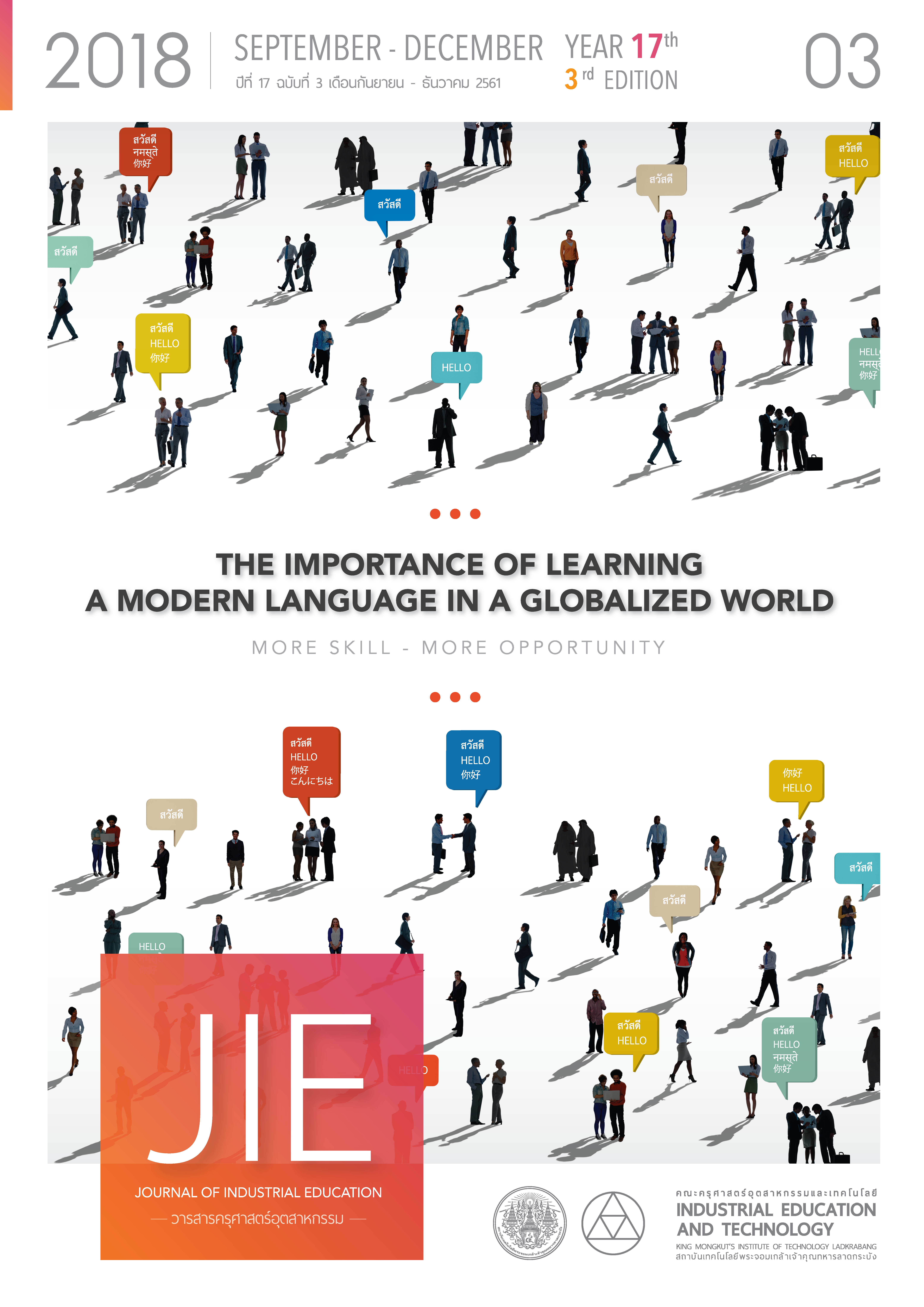สภาพแวดล้อมการเรียนรู้แบบวิศวกรรมความรู้ดิจิทัล เพื่อพัฒนาทักษะเชิงเทคนิคด้านวิศวกรรมซอฟต์แวร์
Main Article Content
บทคัดย่อ
การเรียนรู้แบบวิศวกรรมความรู้ดิจิทัล (Digital Knowledge Engineering-based Learning) เป็นการเรียนรู้ที่ให้ผู้เรียนสามารถเข้ามาสร้างองค์ความรู้ เผยแพร่ กระจาย และแลกเปลี่ยนความรู้ร่วมกับอาจารย์ผู้สอนและผู้เชี่ยวชาญเฉพาะด้านผ่านเทคโนโลยีดิจิทัล ประกอบด้วย 6 ขั้นตอน คือ 1) การสร้างความรู้ (Knowledge Creation) 2) การจัดเก็บความรู้ (Knowledge Storage) 3) การสืบเสาะความรู้ (Knowledge Acquisition) 4) การเข้าถึงความรู้ (Knowledge Access) 5) การแบ่งปันความรู้ (Knowledge Sharing) และ 6) การประยุกต์ใช้ความรู้ (Knowledge Application) โดยสามารถนำไปจัดการเรียนการสอนให้ผู้เรียนเกิดทักษะในการแก้ไขปัญหาทางด้านกระบวนการพัฒนาซอฟต์แวร์ เพื่อให้เกิดทักษะเชิงเทคนิคด้านวิศวกรรมซอฟต์แวร์ (Software Engineering Technical Skills) ประกอบด้วย 5 ทักษะ คือ 1) ทักษะทางด้านความต้องการซอฟต์แวร์ (Software Requirements Skills) 2) ทักษะทางด้านการออกแบบซอฟต์แวร์ (Software Design Skills) 3) ทักษะทางด้านการพัฒนาซอฟต์แวร์ (Software Construction Skills) 4) ทักษะการทดสอบซอฟต์แวร์ (Software Testing Skills) และ 5) ทักษะที่ยั่งยืนทางด้านซอฟต์แวร์ (Software Sustainment Skills)
Article Details
"ข้อคิดเห็น เนื้อหา รวมทั้งการใช้ภาษาในบทความถือเป็นความรับผิดชอบของผู้เขียน"
References
[2] Ministry of Information and Communication Technology. 2011. Information and Communication Technology Policy (ICT2020). Bangkok: Ministry of Information and Communication Technology. (Brochure).
[3] Pimdee, P., Jedaman, P., Kidradarn, P., Sukkamart, A., Wangsa-ard, K., & Suksup, C. 2017. The education development in the 21st contury under the thailand 4.0 framework. Journal of industrial education, 16(2), p. 199-206.
[4] Maneetum, T. 2014. Study of problem images and knowledge management, information technology and communication service centers at Phayao University. Phayao: Phayao University.
[5] NIDTEP. 2005. Knowledge Management in Education. Bangkok: KSP.
[6] Jaikaewma, A. 2018. What is the Yii Framework. Retrieved April 6, 2018, from https://goo.gl/YaXrUf
[7] IEEE. 2014. Software Engineering Competency Model. NJ : IEEE Intellectual Property Rights Office.
[8] Thanalerdsopit, P., & Pongwiritthon, R. 2015. Knowledge Management for Research in Higher Education: A Case Study Rajamangala University of Technology Lanna. FEU Academic Review, 9(2-4), p. 63-75.
[9] Vasconcelos, J, B., Kimble, C., Careteiro, P., & Rocha, A. 2017. The application of knowledge management to software evolution. International Journal of Information Management, 37, p. 1499-1506.
[10] Cerchione, R., & Esposito, E. 2017. Using knowledge management systems: A taxonomy of SME strategies. International Journal of Information Management, 37, p. 1551-1562.
[11] Hassan, H, C. 2013. A Framework for User Requirement Assessment in Technical Education Facility Planning: a Knowledge Engineering Approach. Social and Behavioral Science, 107, p. 104-111.
[12] Thanachawengsakul, T., Wannapiroon, P., & Nilsook, P. 2018. Synthesis of Digital Knowledge Engineering Repository Management System. 2nd International Conference on E-Business and Internet, 2, p. 23.

